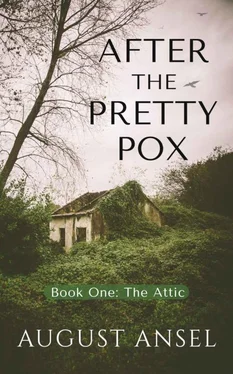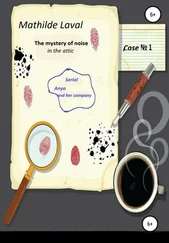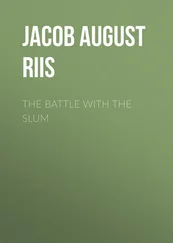Two more stitches finished the job. The brilliant turquoise thread looked weirdly festive against the sewn wound, but the gash was neatly closed. Using the same strip of rag she’d used to bandage her own hand, she wound a dressing around his head, covering her handiwork and keeping his dirty hair from getting near the stitches. She took Handy’s arm and got to her feet. “I imagine you’re thirsty,” she said to the man. He said nothing.
“Hey,” Handy said. He knocked the toe of his boot against the man’s bound feet. “You want some water?”
“Yes,” he whispered.
“Get it for him,” Arie told Handy. “Put some tincture in it.”
“You sure you want to waste good medicine?” Renna said. She didn’t look up from the bird in her hands. A reddish feather hung in her hair like a copper leaf.
Arie turned on her. “Mind your plucking,” she snapped. “I wasted plenty on you, didn’t I?”
Renna kept her head bent over her task and said nothing else.
Arie gathered up the bloody hair she’d set in his lap and tossed it on the heap of feathers Renna was making. Everything else she’d used went back where it belonged. While Renna worked and Handy gave the intruder water, patiently waiting between each small sip, Arie stopped at the mandala. It was days since she’d stood at the labyrinth, although she’d traced it with her eyes dozens of times. She put her finger in the outside ring and moved it along the familiar path. The wood, smooth and glossy with the oil of her skin and the pressure of her touch, felt like warm stone, as though she’d long ago worn away the grain entirely. A sense of comfort dropped over her, a falling away of the troubles all around this dim and stuffy room, as if she were here alone, her finger meandering toward the labyrinth center and out again.
“Where should we cook them?”
She started. Handy was standing right next to her. She hadn’t sensed him there at all. Had she been sleeping? Surely not. But she was leaning against the wall, her cheek pressed to the pattern of the mandala and her hand splayed there between her bosom and the boards. She straightened and felt the little pins-and-needles sense of a limb falling asleep.
“The chickens are clean,” he said. He spoke quietly and didn’t look directly at her. “Shall we spit them?”
“Spit them. Yes,” she said. She rubbed her face with both hands. “Sorry,” she said. “I can’t believe I dropped off to sleep standing here.”
“It’s been a bad day.”
“Aren’t they all?”
He smiled. “Some are not so bad. Now: cook in here, or outside?” He had one chicken in each hand, and he hoisted them to chest height. They were pale and rather scrawny, but a bounty nonetheless.
“In here would probably be the smart thing to do, but this grate is so small, I’m afraid we’d burn them.”
Handy considered the little fireplace. “We could only cook them one at a time in here—it’ll take forever. Outside I can break them down and spit the halves, roast them on the pit all at once. We’ll have the fire put out and be eating right quick.”
They went up together. Arie laid the fire, adding a fat measure of kindling to start building a quick bed of coals. Handy did a perimeter scan while she worked.
“Fat lot of good all our watching did us,” she said, “in the end. The minute you went into the woods, he made a move. Was watching us all along.”
“We had to take the chance,” he said.
“Yes, we did.” The little fire blazed in the pit, already hot and hungry. She fed in more twigs and small splits of cut wood, relishing the heat on her face and hands. “And here he is with us,” she said.
Handy moved from spot to spot, checking with the binoculars. “I’m going down,” he said. He paid the rope ladder over the edge of the roof.
Arie looked up from the fire. “I wish you wouldn’t,” she said. Having the rope ladder hanging made her feel jumpy. “Can’t you check from inside?”
He shook his head. “I don’t want him seeing that hatch,” he said. “You keep watch here at the ladder. I’ll be quick.” He was already over the side and going down.
Arie laid on a little more wood and then squatted at the edge of the roof, looking into the bramble where the rope ladder dangled. Handy looked up and gave a little nod. Knife in hand, he crept close to the house, looking in all directions and glancing in through unboarded windows. He moved around the corner to the front of the house and disappeared. Her body tensed when she lost sight of him, just as it had when she watched him head into the woods earlier. From where she waited, she saw their small cookfire had diminished; she hurried to it, added more fuel, and returned to her post. After what seemed a very long and silent wait, Handy finally returned, sidling behind the brambles to hurry up the rungs, agile as a monkey.
“Nothing,” he said.
“Like always?” She returned to the fire. The bed of coals was ready enough. Handy pulled up the ladder and joined her. He split each of the chickens into halves and skewered each one onto a thin metal spit that fit on a rack above the pit. “That’s still over-hot,” Arie said. “Mind you turn it, or they’ll be black before they’re cooked through.” She left him to cooking and tended the garden. When she stirred the compost basket, it looked dark and broken down enough to throw a thin layer over the soil. A half dozen bright-red worms, whose prolific parents she’d dug at the river and added to the compost by hand, waved momentarily in the open air, slowly burrowing under to add their effort to the garden.
Handy rotated the spit every few seconds. The small amount of fat the chickens sported had begun to melt, dripping into the embers with bright sizzles. The smell was already bringing back her own memories of family meals long gone. As a child, she’d helped make chicken dinner every Sunday. The little boys chased and dispatched the pullets, the little girls plucked, then the older sisters did the gutting and cooking, all while Mammy Delonda supervised from a comfortable and leisurely distance. The smell of the roasting birds opened some old transit in her mind, and she had a sudden clear memory of the Sunday she’d first been allowed to move from plucking—smelly and tedious—to preparation with Lulu and Mercy.
“We’ll probably have to kill him,” Handy said. As always, his voice was low and even.
“Kill him. That’s a leap, Brother.”
“No.” He turned the spit a quarter-revolution.
The low clouds that had hung in all day were thinned enough that Arie could see ribbons of pale blue. There would be a beautiful sunset. “Rest is not mine to give,” she said. “We aren’t his judges, are we? I’m not the author of his life, but you’ll make me his executioner?”
“He set his own fate in motion when he climbed that ladder and broke in.”
“You broke in, too.”
The cook fire lit Handy’s face and reflected yellow in his pale eyes. “I did. And I set my fate.”
“I might have killed you. Might have let Renna die, for sure. She was close to it when you got her here.”
He tended their meal and said nothing.
“We can’t choose that for him,” Arie said. She loosened the bandage on her hand partway and straightened it, rewound it. Her heartbeat had quickened and the little cut throbbed in time. “Handy,” she said. He looked at her. “Not yet. We’ll give him a chance.”
“A chance,” he said. “To do what, exactly?”
“I may be a fool,” she said. “In fact, I assure you I am a fool. But I want your word that we’ll make this decision together. Hand me your knife.” She speared the meat at the leg joints. The juices ran clear and hissed in the coals, now brilliant white and yellow in the late afternoon. “These are cooked,” she said.
Читать дальше












